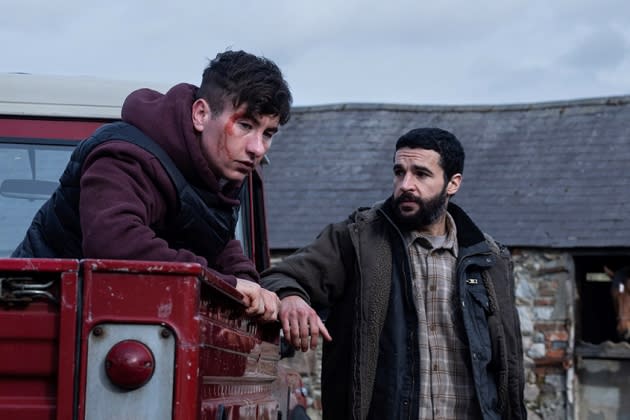‘Bring Them Down’ Director Christopher Andrews on Losing Paul Mescal — but Gaining Barry Keoghan — for His Irish Thriller: ‘We Struck Lucky’

What do you do when you lose Paul Mescal as one of your lead stars? In the case of filmmaker Christopher Andrews and his tense revenge thriller ‘Bring Them Down,’ bowing in Toronto on Sep. 8, you simply replace the Oscar-nominated and in-demand young Irish star of the moment with the other Oscar-nominated and in-demand Irish star of the moment, Barry Keoghan.
But that wasn’t the only element the debut director switched around with great effect in his Mubi-backed feature, also starring Christopher Abbott and diving into an escalating conflict between two rival sheep farming families in rural Ireland. Based on his own experience working in farms in the north of England, the film — produced by Wild Swim Films, Tailored Films and Frakas Productions — was originally written to be set and shot in the U.K., but the production shifted to Wicklow in Ireland (although its set in Connemara) to take advantage of the country’s generous tax credits.
More from Variety
As Andrews — whose previous experience include working in the camera department for the first three seasons of “Shameless” — explains, he went to great lengths to give it local authenticity, with much of the film actually spoken in Irish (and most of it by Abbott, one of few Irishmen in the cast)
Speaking to Variety, Andrews discusses landing Keoghan just as his star power skyrocketed following “The Banshees of Inisherin, how Abbott’s Irish convinced a local and the trials of creating a field full of dead sheep.
“Bring Them Down” was originally written to be set and shot in the U.K., but because of Ireland’s tax incentive, you rewrote it to shoot there. How did you manage this?
It was very important for me for it to feel authentic and to feel like it was connected and not just transported over. So we went there in the first instance and I talked to farmers and told them the original story and they were like, ‘Yeah, that happened just down the road.’ Because the way that they farm in the north of England is the same. It was brought over by the Vikings over 1000 years ago. But it was really important that it was rooted in that world and felt truthful to the landscape and then there was the process of reshaping it with the dialect.
The film was originally announced with Paul Mescal and Tom Burke attached, which was a pretty amazing pairing. And then it was recast with Barry Keoghan and Christopher Abbott, which isn’t exactly the worst replacement. How did that all come about?
It would have been a brilliant film either way, but it’s just part of the process of casting. And when you’re working on a budget you’re working on you can’t compete with bigger movies — such as Mad Max: Fury Road [which starred Burke] — and there are lots spinning wheels out of your control. But it was just a privilege to be get Chris and Barry. It was incredible. And to have them respond so well to the material — they were really engaged, so it felt really exciting. Everywhere you looked it was a win.
Were you shooting with Barry after his success with “The Banshees of Inisherin”?
He was attached before the peak of “Banshees.” They’d made the film but he hadn’t seen it. And then he was nominated and won the BAFTA. And he was nominated for the Oscar on the second day of shooting. We struck lucky!
I hope you gave him five minutes to enjoy his Oscar nomination…
No! Ha! No, he had lunch back at his trailer. But there wasn’t five minute to have. They’re in every scene and the clock’s ticking. But he definitely enjoyed it afterwards.
It’s actually Abbott’s character who has the most dialog in Irish. I don’t speak Irish, but it sounded impressive to me. Did he go on a crash course or learn his lines specifically?
Yeah, he learned those lines specifically. He was doing these workshops and learning the lines phonetically and then understanding what it meant. And then if we needed to tweak it, we’d figure it out. But they’re so laconic, the characters, these archetypal western characters who say very little, which kind of helped. But he did an exceptional job. Our grip was from Connecticut and lives in Ireland and said he thought he’d seen every Irish film and knew every Irish actor, but just couldn’t wrap his brains around it and didn’t know where he came from, and I was like, ‘He’s also from Connecticut.’
I don’t want to give away any spoilers, but there are a lot of dead sheep in this. How does one go about making a lot of realistic looking dead sheep and was it a headache for the production department?
Yeah, it was really difficult. But we had two different types of puppets. One was just like a beanbag that you could throw around and shove in the back of the truck. And then there was one which had its legs removed. It wasn’t animatronic, but it was controlled by a puppeteer using brake cables and then embellished with VFX. We gave them breath and life in their eyes. And there were the wounds, which were pretty gruesome. It was really tough. So we had two hero sheep and all the others were made by our production designer out of bails of wool and chicken wire, with their faces made out of milk cartons. And we’d place them in the fields and when the wind would rise they’d be blowing around like tumbleweeds, until we pegged them down.
Best of Variety
Sign up for Variety's Newsletter. For the latest news, follow us on Facebook, Twitter, and Instagram.

 Yahoo Lifestyle
Yahoo Lifestyle